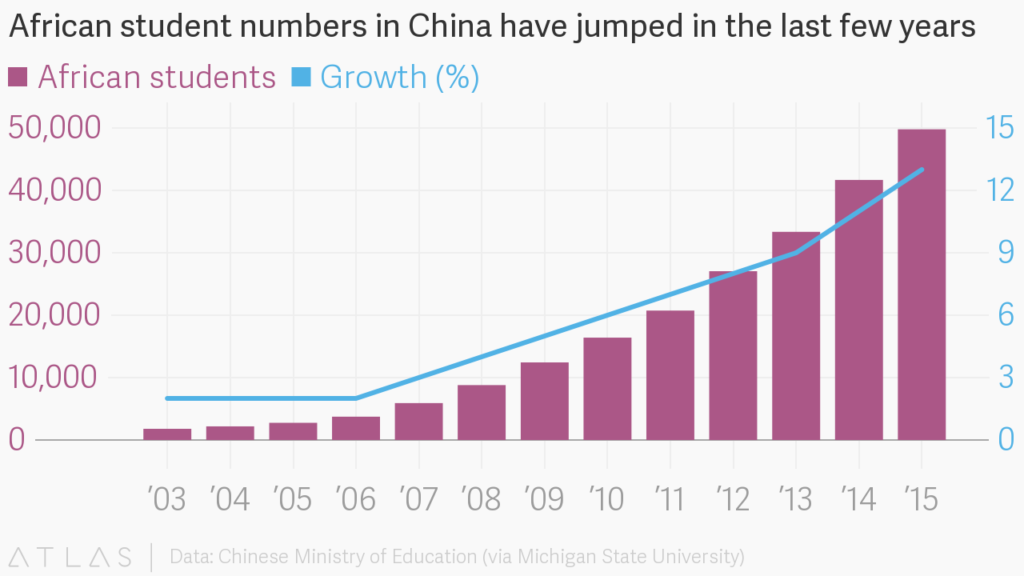African students are choosing to study in China over the US.

The increase in the number of African students in China is remarkable. In less than 15 years, the number of African students has increased 26-fold, from just under 2,000 in 2003 to almost 50,000 in 2015. But why do African students are choosing to study in China over the US?
According to the UNESCO Institute for Statistics, the United States and the United Kingdom host about 40,000 African students a year. China surpassed this figure in 2014, making it the second largest destination for African students abroad after France, which hosts just over 95,000 students.

For years, these figures have not been translated into the online archive of the Chinese Ministry of Education. But a recent initiative by researchers at Michigan State University to translate them introduces reports to a wider audience. These reports have not only revealed the growth of Sino-African ties. They also make it possible to compare China’s trends in international education in a global context.
Chinese universities are filled with international students from around the world, including from Asia, the Americas, Europe, and Oceania. The proportion of international students in Asia is still lower than that of Africans, who represent 13% of the workforce. But that number, up 2% in 2003, is growing every year and much faster than in other regions. Proportionately, every year, more African students come to China than students from around the world.
This dramatic increase in the number of students in Africa can be explained in part by the priority given by the Chinese government to the development of human resources and education in Africa. Beginning in 2000, the summits of the China Forum on China-Africa Cooperation pledged financial and political support for African education in China and abroad.
Since 2006, China has set scholarship targets to help African students come to China to study. For example, at the last summit in 2015, China committed to provide 30,000 scholarships to African students by 2018.
Although China stopped publishing regional data on scholarships in 2008, our analysis of data using 2003-2008 data to generate scholarship estimates suggests that this goal is about to be achieved. China seems to be keeping the commitments made for education in Africa. This may be one of the most important reasons why African students are choosing to study in China over the US.
Mutual benefit
For the Chinese government, educating Africans is an extension of China’s unobtrusive power to cultivate the next generation of scholars and African elites. The experience gained by these students in China can translate into a willingness to work with China and to see China’s internal or external policies in a favorable way in the future.
But what do African students earn? Sino-African researchers have discovered that students are going to China for many reasons. Some will simply pursue affordable studies, even without a scholarship, while others will have the chance to develop business relationships or learn the language of a country presumed to be a rising power.
On the basis of several surveys, most students tend to be enrolled in Chinese courses or engineering degrees. The preference for engineering can be explained by the fact that many engineering programs offered by Chinese universities to international students are taught in English.
The quality of education has received mixed reviews. Some studies have shown that African students are generally satisfied with their education in Chinese, as they can overcome language barriers. Others found that while students were not impressed by their education, they appreciated the commercial and commercial opportunities that Chinese education offered them at home.
The next generation
It is difficult to know exactly which African countries send the most students to China. This information is not kept by the Chinese Ministry of Education. But Tsinghua University’s statistics provide insight. During the 2015-2016 academic year, the majority of the university’s 111 African students came from Zimbabwe, Ethiopia, Tanzania, Morocco, Eritrea and Cameroon, slightly in favor of the university. ‘East Africa.
Most African students in France come from French-speaking West Africa. If Tsinghua’s profile is valid for the largest number of African students in China, it means that China is an increasingly important player in the education of countries outside West Africa.
Due to Chinese visa rules, most international students can not stay in China once their studies are completed. This prevents brain drain and means that China trains a generation of African students who – unlike their French, American and British counterparts – are more likely to return home and bring with them their new education and new skills. .
It is still too early to say how this new dynamic could shape geopolitics on the continent.
culled from: Quartz Africa




